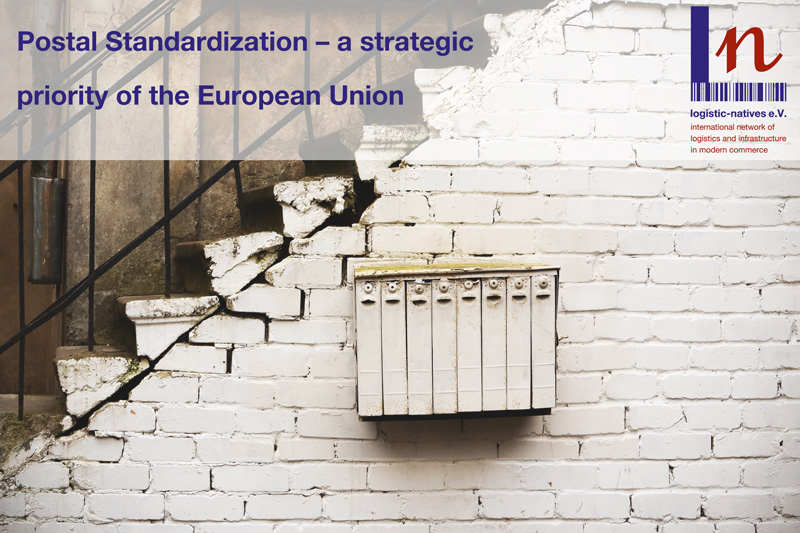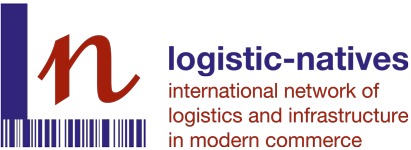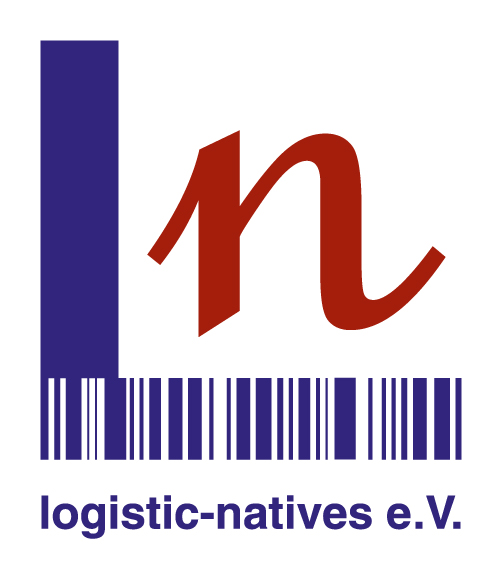Background information logistic-natives: Postal Standardization – a strategic priority of the European Union

Background information logistic-natives:
Postal Standardization – a strategic priority of the European Union
The annual Union Work Programme for European Standardization for 2022 defines postal services as one of the strategic priorities. It particularly emphasised in point x.x5 (reference to the EU Standardization Strategy published 2 February 2022) the need to improve the quality of service and to promote interoperability between national networks, and the existence of an efficient universal service within the internal market.
The intention to request drafting of European standards and European standardization deliverables in support of Directive 97/67/EC (Postal Service Directive) as amended by Directives 2002/39/EC and 2008/6/EC, as well as in support of the implementation of the Regulation (EU) 2018/644 on cross-border parcel delivery services, is stated in point xx (reference to the EU Standardization Strategy published 2 February 2022) in the table entitled ‚New actions‘ set out in the annual Union work programme for European standardization for 2022.
Technical standardization is indispensable for the promotion of interoperability between national networks and for the existence of an efficient universal service.
The European Committee for Standardization (CEN) will be entrusted with drawing up technical standards applicable in the postal sector following standardization requests adopted by the Commission. This work will consider the harmonization measures adopted at international level, and in particular those decided upon within the Universal Postal Union.
Due to the international nature of the postal and parcel sector, the further development of European and international technical standards is important in order to benefit users and the environment, and to broaden market opportunities for businesses. Furthermore, users often report quality of service issues when sending, receiving or returning cross-border parcels. Consequently, there is an equal need for further improvements in the quality of service standards and in the interoperability of cross-border parcel delivery services.
The Report on the application of the Postal Services Directive0F1 concludes that technical standards are not being sufficiently applied and that this may negatively impact interoperability. The interconnection of postal networks is becoming increasingly relevant to promoting quality of service, innovative services and the European interoperability of letter and parcel delivery operations.
It is appropriate to revise some standards and standardization deliverables under the previous standardization mandate M/548 of 1 August 2016 (the 4th Mandate) and to adapt them, in particular to reflect the latest regulatory developments of the Regulation (EU) No 910/2014 (eIDAS Regulation)1F2,2F3. Those standards and standardization deliverables related to „secured electronic postal service (SePS)“ should be adopted by CEN by the deadlines as set out in the 5th EU Commission Standardization Request.
To achieve the necessary harmonization between the European standardization framework and the international specifications developed internationally in the postal sector by the UPU, the UPU and CEN will consult and decide which body will lead the pending revisions of UPU S43a & b and S52, converting them into CEN format over the coming months.
All relevant interested parties, including the Member States and the European stakeholder organisations, who receive Union financing in accordance with Regulation (EU) No 1025/2012 may identify where additional standards are required. It may therefore be necessary to adjust the scope of this request, by adding new items to the list of European standards and European standardization deliverables as set out in (the currently under final revision) 5th Mandate to CEN.
To ensure the principles and inclusiveness of the development, revision and amendment of technical and messaging standards, the European standardization organisations (ESO) have agreed to follow the Guidelines for the execution of standardization requests4.
European Standardization Organizations
Together, CEN and CENELEC provide a platform for the development of European Standards. Each European country is represented in CEN and CENELEC by its national standards body, with one member per country.
The decision to actively participate in standards work at European level is made within the national committees. The work is carried out in national “mirror” committees, where the national standpoint on a subject is formed. National delegations are sent to CEN or CENELEC to represent that standpoint.
ETSI provides members with an open, inclusive, and collaborative environment. This environment supports the timely development, ratification and testing of globally applicable standards for ICT-enabled systems, applications, and services.
International Standardization Organizations
ISO and IEC are networks of national standards organizations. They are private organizations made up of national members, with one member per country. Germany is represented by DIN in ISO, and by DKE in IEC. International working bodies are led decentrally by secretariats in countries all over the world. DIN holds many ISO secretariats.
The decision to actively participate in standards work at international level is made within the national committees.
ITU’s ultimate aim is high-quality international standards; delivered using an efficient, inclusive standardization process; supporting ICT growth and innovation across a wide range of industry sectors; bridging development divides as well as gender divides. Achieving this aim will call for ITU standardization to address the needs of an expanding array of ICT applications. We see this reflected in the growth and evolution of the membership of ITU’s standardization arm (ITU-T).
NOTE: The Universal Postal Union (UPU) is neither a European nor an International Standardization Organization
February 03, 2022
Here you can download the Paper (PDF)

Florian Seikel
Managing Director
Tel. +49 162-2561001

